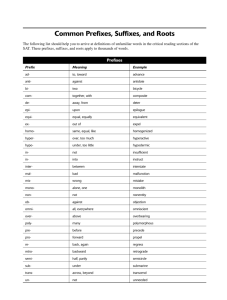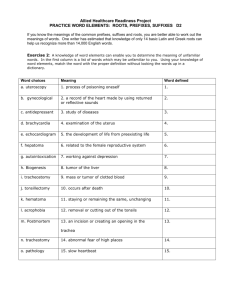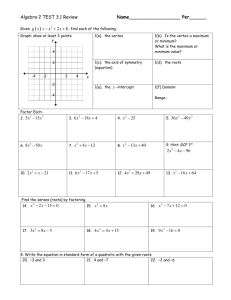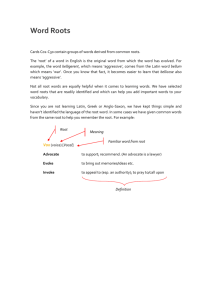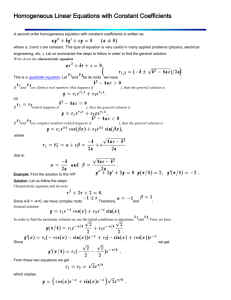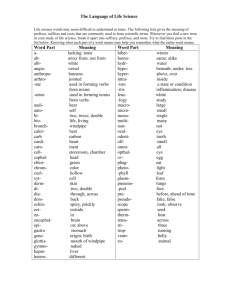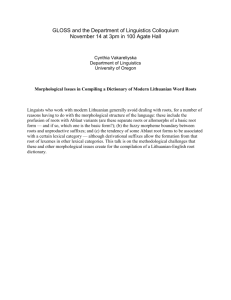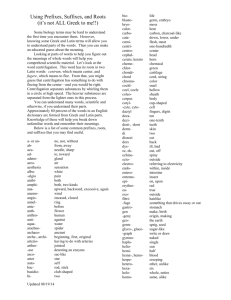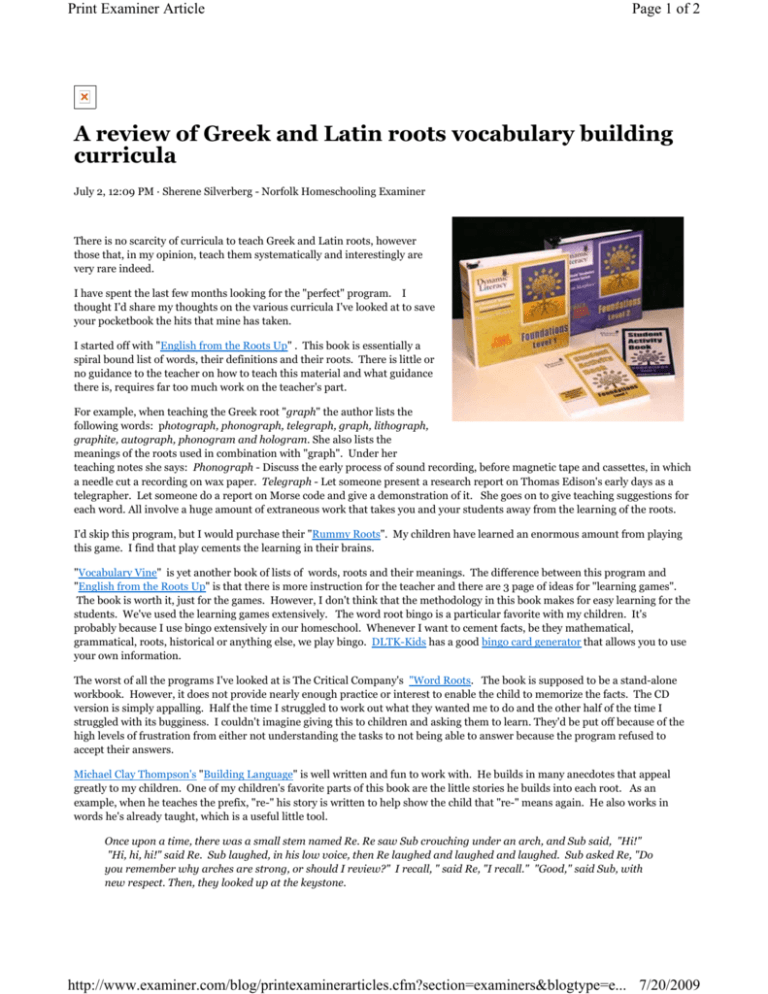
Print Examiner Article
Page 1 of 2
A review of Greek and Latin roots vocabulary building
curricula
July 2, 12:09 PM · Sherene Silverberg - Norfolk Homeschooling Examiner
There is no scarcity of curricula to teach Greek and Latin roots, however
those that, in my opinion, teach them systematically and interestingly are
very rare indeed.
I have spent the last few months looking for the "perfect" program. I
thought I'd share my thoughts on the various curricula I've looked at to save
your pocketbook the hits that mine has taken.
I started off with "English from the Roots Up" . This book is essentially a
spiral bound list of words, their definitions and their roots. There is little or
no guidance to the teacher on how to teach this material and what guidance
there is, requires far too much work on the teacher's part.
For example, when teaching the Greek root "graph" the author lists the
following words: photograph, phonograph, telegraph, graph, lithograph,
graphite, autograph, phonogram and hologram. She also lists the
meanings of the roots used in combination with "graph". Under her
teaching notes she says: Phonograph - Discuss the early process of sound recording, before magnetic tape and cassettes, in which
a needle cut a recording on wax paper. Telegraph - Let someone present a research report on Thomas Edison's early days as a
telegrapher. Let someone do a report on Morse code and give a demonstration of it. She goes on to give teaching suggestions for
each word. All involve a huge amount of extraneous work that takes you and your students away from the learning of the roots.
I'd skip this program, but I would purchase their "Rummy Roots". My children have learned an enormous amount from playing
this game. I find that play cements the learning in their brains.
"Vocabulary Vine" is yet another book of lists of words, roots and their meanings. The difference between this program and
"English from the Roots Up" is that there is more instruction for the teacher and there are 3 page of ideas for "learning games".
The book is worth it, just for the games. However, I don't think that the methodology in this book makes for easy learning for the
students. We've used the learning games extensively. The word root bingo is a particular favorite with my children. It's
probably because I use bingo extensively in our homeschool. Whenever I want to cement facts, be they mathematical,
grammatical, roots, historical or anything else, we play bingo. DLTK-Kids has a good bingo card generator that allows you to use
your own information.
The worst of all the programs I've looked at is The Critical Company's "Word Roots. The book is supposed to be a stand-alone
workbook. However, it does not provide nearly enough practice or interest to enable the child to memorize the facts. The CD
version is simply appalling. Half the time I struggled to work out what they wanted me to do and the other half of the time I
struggled with its bugginess. I couldn't imagine giving this to children and asking them to learn. They'd be put off because of the
high levels of frustration from either not understanding the tasks to not being able to answer because the program refused to
accept their answers.
Michael Clay Thompson's "Building Language" is well written and fun to work with. He builds in many anecdotes that appeal
greatly to my children. One of my children's favorite parts of this book are the little stories he builds into each root. As an
example, when he teaches the prefix, "re-" his story is written to help show the child that "re-" means again. He also works in
words he's already taught, which is a useful little tool.
Once upon a time, there was a small stem named Re. Re saw Sub crouching under an arch, and Sub said, "Hi!"
"Hi, hi, hi!" said Re. Sub laughed, in his low voice, then Re laughed and laughed and laughed. Sub asked Re, "Do
you remember why arches are strong, or should I review?" I recall, " said Re, "I recall." "Good," said Sub, with
new respect. Then, they looked up at the keystone.
http://www.examiner.com/blog/printexaminerarticles.cfm?section=examiners&blogtype=e... 7/20/2009
Print Examiner Article
Page 2 of 2
He includes activities like having the children write poems or similes using the prefixes and roots. This program is a good fit for
my highly verbally gifted daughter, but not such a good fit for my mathematical son.
My problem with this program is that you motor through each book really quickly and you need multiple books because he
severely limits the number of prefixes, suffixes and roots he teaches in each book. I'd prefer a smaller typeface and more
information per book. There is also no need to purchase the student books as these are not consumable (at least the first one
isn't). A teacher's manual is sufficient.
I purchased "Words on the Vine" based on the superb reviews this program received on Amazon.com. The book comprises 36
vocabulary units based on root words. Each unit teaches on root and provides the child three different and often very funny,
activities to cement the words.
My issue with this program is that it does not teach systematically. For example, the first root that is taught is the root "foli"
meaning "leaf". The words taught are: bifolate, defoliant, exfoliate, foliage, folic acid, folio, portfolio, trefoil, foil and unifoliate.
However, there is no teaching or practice of the roots/prefixes/suffixes which means that in order for my children to learn the
words by any method other than brute memorization, I have to teach those roots as in the foli lesson.
With the exception of Michael Clay Thompson's program, all of the above were disappointing to me. I was looking for something
that taught roots in a way that built slowly, but systematically and did not assume any prior knowledge of roots.
Quite fortuitously, I received an email promoting "WorldBuild" by Dynamic Literacy and offering a 25% off discount code (It's
DHS9246 and it expires on 8/1/2009 if you are so interested). Dynamic Literacy has only recently started promoting its product
to the homeschool market. The program is written for classrooms but adapts easily for home use. A video on the product can be
found here.
I recommend starting off with their "Foundations" series as it teaches prefixes and suffixes and builds on students' prior
knowledge by attaching them to words they already know.. It comes with extensive teaching notes which I appreciate. Each new
suffix/prefix that is introduced has 5 different activities accompanying it. The suggestion is that you do one activity a day and one
new word a week. Each activity requires writing.
There is no way this will work for our family. We sit down and do all the activities in one day and we don't do all the writing. We
do the activities but I let the children vocalize some of their answers instead of writing them. (I do this because otherwise it takes
too long as Ben is still a slow writer. When it takes too long, he becomes bored and then all enjoyment flies out of the window)
The "Elements" Series works slightly differently from the "Foundations" series. I like how they teach 3 prefixs, 3 roots, and 3
suffixes at a time and then show the children how they have learned the meanings to 48 words. If you teach just three more roots
(that's teaching a mere 12 morphemes) the child will have learned the meaning of 96 words.
This method of teaching makes sense to me. It's systematic and simple for the child to understand and for mom to teach.
Furthermore, you are reducing brute force memorization.
To add to the fun of practicing their new knowledge, "WordBuild, the game", a computer game, can also be purchased.
As an added bonus to the teacher, once you've purchased one of their products you are given access to a members forum where
you can access additional worksheets and information. It allows you to look ahead on the series you are working on.
"WordBuild" fits my family's needs perfectly and I highly recommend it to other homeschoolers. You can look at a sample lesson
of Foundations here and a sample of Elements here.
For more info: WordBuild, my recommendation for a vocabulary building curriculum using Greek and Latin roots.
Copyright 2009 Examiner.com. All rights reserved. This material may not be published, broadcast, rewritten or redistributed.
Author
Sherene Silverberg is an Examiner from Norfolk. You can see Sherene's articles at:
"http://www.Examiner.com/x-10127-Norfolk-Homeschooling-Examiner"
http://www.examiner.com/blog/printexaminerarticles.cfm?section=examiners&blogtype=e... 7/20/2009


